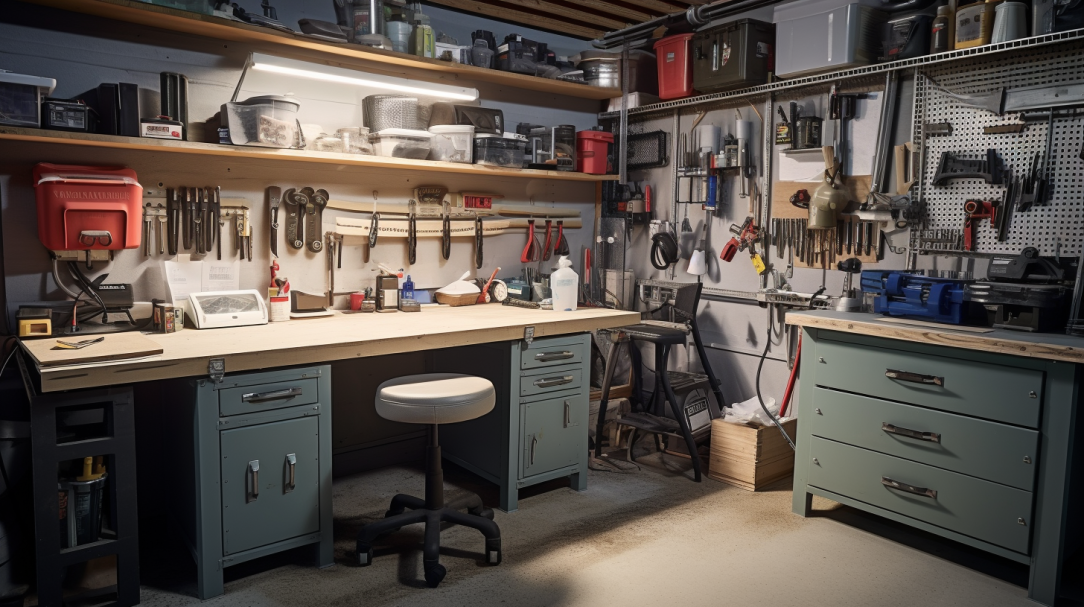We've got all the tools you need for safe water heater repair! In this article, we'll show you the must-have equipment to fix your water heater like a pro.
With our handy wrenches, pliers, and pipe cutters, you'll be able to tackle any repair job with ease.
Plus, our multimeter and voltage tester will help you identify and fix any electrical issues.
Don't forget the teflon tape and sealants for a secure and leak-free repair.
Let's get started!
Safety Equipment
We recommend using safety equipment such as gloves, goggles, and a face mask when performing water heater repairs. Safety should always be a top priority when working with potentially hazardous materials and tools.
Gloves provide protection against burns and cuts, preventing any direct contact with hot surfaces or sharp edges.
Goggles are essential for shielding our eyes from sparks, debris, and chemical splashes.
A face mask, on the other hand, safeguards our respiratory system by filtering out harmful fumes and dust particles.
By wearing this safety equipment, we minimize the risk of accidents and injuries, ensuring a safe working environment.
Wrenches and Pliers
To effectively handle water heater repairs, we should have the following tools in our toolbox:
- Wrenches: Wrenches are must-have tools that will make the repair process much easier. When it comes to water heater repairs, these tools are essential for tasks such as loosening and tightening nuts and bolts, as well as gripping and turning pipes. A good adjustable wrench is versatile and can be used for various sizes of nuts and bolts. It allows us to apply the right amount of torque without damaging the parts.
- Pliers: Pliers are also important for gripping and turning pipes, especially when dealing with tight spaces. They are useful for tasks such as removing or installing pipe fittings. With the right set of pliers, we can confidently handle any water heater repair job efficiently and safely.
Having these tools in our toolbox will ensure that we are well-equipped to handle any water heater repair effectively.
Multimeter and Voltage Tester
When it comes to safely repairing water heaters, a multimeter and voltage tester are essential tools for accurately measuring electrical currents and ensuring the proper functioning of the unit.
These tools allow us to diagnose any electrical issues that may be affecting the water heater, such as faulty wiring or a malfunctioning thermostat. By using the multimeter, we can measure voltage, resistance, and continuity, which helps us identify any potential problems and take the appropriate steps to fix them.
The voltage tester, on the other hand, allows us to quickly and easily check if there's current flowing through a particular circuit or if there's an electrical fault.
Together, these tools provide us with the necessary information to effectively and safely repair water heaters.
Pipe Cutters and Torch Kit
To effectively continue our water heater repair process, it's crucial to have a set of pipe cutters and a torch kit on hand. These tools are essential for dealing with any potential pipe issues during the repair.
Pipe cutters are specifically designed to cut through pipes cleanly and accurately, ensuring a precise and secure fit when replacing damaged sections. With a pipe cutter, we can easily remove the damaged parts and install new ones without causing further damage.
Additionally, a torch kit is necessary for soldering or welding pipes together. This allows us to create strong and durable connections that will withstand the pressure and heat of the water heater.
Teflon Tape and Sealants
A crucial tool for ensuring a secure and leak-free water heater repair is the use of proper Teflon tape and sealants. When working with pipes and fittings, it's essential to create a tight and reliable seal to prevent any water leakage.
Teflon tape, also known as plumber's tape, is a thin, white tape made of polytetrafluoroethylene (PTFE). It's wrapped around the threads of pipe fittings to provide a watertight seal. Teflon tape is easy to use and highly effective in preventing leaks.
Additionally, sealants such as pipe dope or joint compound can be applied to further enhance the sealing capabilities. These products fill in any gaps or imperfections in the threads, ensuring a secure and long-lasting connection.
Frequently Asked Questions
How Often Should I Perform Maintenance on My Water Heater to Ensure Its Safe Operation?
To ensure the safe operation of our water heater, we should perform regular maintenance. This includes checking the pressure relief valve, inspecting the anode rod, and flushing the tank to remove sediment buildup.
By doing these tasks on a regular basis, we can prevent potential issues and extend the lifespan of our water heater.
It's recommended to perform maintenance at least once a year, but consult the manufacturer's guidelines for specific recommendations.
What Are Some Common Signs That Indicate a Potential Safety Issue With a Water Heater?
Some common signs that indicate a potential safety issue with a water heater include:
- Strange noises
- Leaks
- Discolored water
- Lack of hot water
These indicators could point to problems with the heating element, pressure relief valve, or tank integrity.
It's important to address these issues promptly to prevent any further damage or potential safety hazards.
Regular maintenance and inspections can help identify and resolve these problems before they escalate.
Can I Use Regular Tape or Sealant Instead of Teflon Tape and Sealants for Water Heater Repairs?
Regular tape or sealant shouldn't be used as a substitute for teflon tape and sealants when it comes to water heater repairs. Teflon tape and sealants are specifically designed to withstand high temperatures and prevent leaks in plumbing connections.
Using regular tape or sealant could lead to leaks, which can cause water damage and potential safety hazards. It's important to use the right tools and materials to ensure a safe and effective water heater repair.
Is It Necessary to Shut off the Power Supply to the Water Heater Before Performing Any Repairs or Maintenance?
Yes, it's necessary to shut off the power supply to the water heater before performing any repairs or maintenance. This ensures our safety and prevents any accidents or electrical shocks.
By turning off the power, we eliminate the risk of electrically charged parts causing harm. It's a crucial step that should never be skipped when working on a water heater.
Safety should always be our top priority when conducting any repairs or maintenance.
Are There Any Specific Safety Precautions I Should Take When Using Pipe Cutters and a Torch Kit for Water Heater Repairs?
When using pipe cutters and a torch kit for water heater repairs, there are several safety precautions we should take.
First, always wear safety goggles and gloves to protect our eyes and hands.
Second, ensure that the workspace is well-ventilated to prevent the accumulation of fumes.
Additionally, make sure to have a fire extinguisher nearby in case of any accidents.
Lastly, familiarize ourselves with the proper operation of the tools to minimize the risk of injury.
Conclusion
In conclusion, having the right tools is essential for a safe water heater repair.
Safety equipment such as gloves and goggles protect against accidents, while wrenches and pliers help with loosening and tightening connections.
A multimeter and voltage tester ensure that the electrical components are functioning properly.
Pipe cutters and a torch kit are necessary for replacing damaged pipes.
Finally, using Teflon tape and sealants properly ensures leak-free connections.
With these must-have tools, anyone can confidently and safely repair their water heater.



